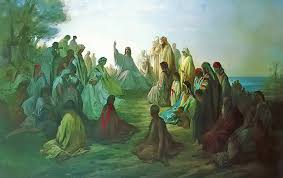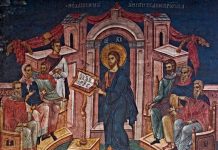‘You are the light of the world. A city built on a hill cannot be hidden’ (Mt. 5:14).
Imagine the astonishment of those who heard these words for the very first time. Our Lord extended their importance to universal proportions; and yet He says the same of us and to us in this our hearing. We who listen to Him today are also engaged in a work whose proportion and scope is no less universal. We are Catholic; and we are part of an enterprise of faith whose scope extends far beyond the limits even of time. ‘You are the light of the world. A city built on a hill cannot be hidden’ (Mt. 5:14). This city is the Church, established in the midst of the world and above the world. There is an ancient Christian document, the Letter to Diognetus which states in very clear terms: What the soul is to the body; that Christians are to the world. It goes on to say: As the soul is present in every part of the body, while remaining distinct from it, so Christians are found in all the cities of the world, but cannot be identified with the world…. As the soul benefits from the deprivation of food and drink, so Christians flourish under persecution. Such is the Christian’s lofty and divinely appointed function, from which he is not permitted to excuse himself.
Christians are today the most persecuted religious group in the world. And this is not only the case is Muslim majority nations like Pakistan or in North Korea; here in our own country acts of vandalism against church buildings have become an all-too-common occurrence and anti-Christian sentiments are deemed understandable. Nevertheless, we cannot excuse ourselves from our divinely appointed function. We are not our own masters. The city that we inhabit is the City of God; and all nations stream to this city for strength, instruction and protection. Let your light shine before men, so that they may see your good works and give glory to your Father in Heaven (Mt. 5:16).
This is a lofty calling and yet, we know that with the help of God’s grace, it is possible for us to be faithful to what Our Lord calls us to be and to do. Our Lord calls us not only to be virtuous but to be the salt, that is, to raise the level of flavor of every human activity and thus transform it. What is of itself insipid can be delightful if seasoned with joy and devotion. What would be irretrievably lost to the passage of time and decay can be preserved unto eternity in the Lord by the salt of Christian memory (Erasmo Leiva-Merikakis, Heart of the World, Vol. 1, p. 205). Practically, this means that we submit ourselves to process of transformation that engages each one of us personally and intimately, and in turn, the world around us by permeating the whole of our lives with the salt of Christian memory. We do this principally through the graces of the liturgical year with its feasts and commemorations, especially the commemorations of the Saints, vessels of grace and the lights of the world in their several generations. It is their precious memory that enables us to appreciate and to defend Sacred Tradition as an indispensable element of our life.
As we face the challenges posed by a globalist worldview that either relativizes these realities or negates them altogether, there is a real danger that we risk losing our unique identity and so fail in our obligation to be the light of the world. Tragically and inconceivably, our Sacred Tradition is also sustaining furious attacks from within the Church herself and we must not deny this state of affairs as if in so doing we are somehow disobedient or disloyal. Rather, we must counter and resist this scandalous and inexplicable development. The Church has a history and a culture and she has civilized the world by word and by example. This is why it is so important for us to be brutally honest about the forces at work both in the world – and unfortunately, in the Church herself – that would have us deny our traditions and teachings in the interests of relevance. A house divided against itself cannot stand (Cf. Mk. 3:25). We have absolutely no authority to change the traditional faith of the Church.
There is great unrest in the world and the greater culture that we inhabit has established a different ethical universe; one in which the categories of truth and goodness, logic and life are violently opposed and negated with impunity. The normalisation of degeneracy has, as inescapable consequence, not least the normalisation of more and more degeneracy and it is past time to say ‘enough’. If we wish to survive in any meaningful manner without being overwhelmed in this lawless dystopia, it is now necessary to distance ourselves intentionally and deliberately from this ungodly society, so that we might remain distinct. It was no different for the earliest Christians.
The times are such that we called to live a life of pure faith, which leans on nothing other than God Himself. As we continue to experience the diminishment of the Church amidst internal and external persecutions, only our endurance and constancy, leaning on nothing other than God Himself and our bond of faith and charity will enable us to raise the level of flavor of every human activity and thus transform it. In this light, despite the degeneracy of our times, the natural bond of marriage is still a sacramental sign of God’s faithful love for His people, the gift of human sexuality is seen as sacred, suffering lovingly and patiently borne becomes co-redemptive and a participation in the Passion of Our Lord; and we offer our bodies as a living sacrifice, holy and pleasing to God; this being our true and proper worship. So we do not conform ourselves to the pattern of this world but are transformed by the renewing of our mind (Cf. Rom. 12:1-2). ‘You are the light of the world. A city built on a hill cannot be hidden’ (Mt. 5:14). The work of God that engages us intimately and collectively is our lofty and divinely appointed function not simply for our own benefit but also for the whole world which Our Lord has redeemed with His Most Precious Blood.










